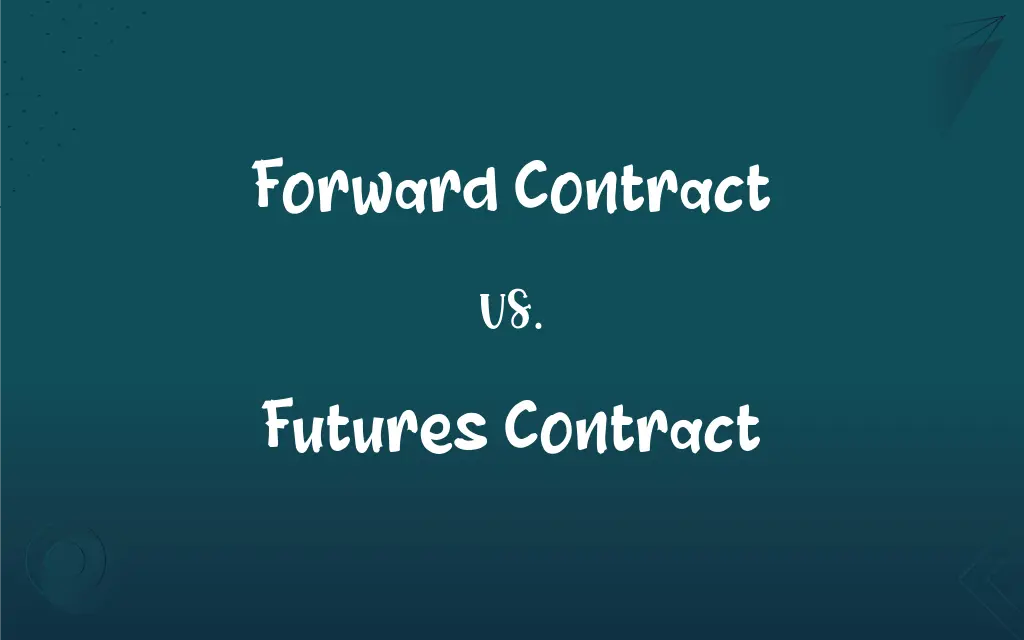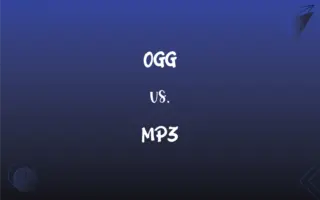Forward Contract vs. Futures Contract: What's the Difference?
Edited by Aimie Carlson || By Janet White || Published on February 5, 2024
A forward contract is a customized, non-standardized agreement between two parties to buy/sell an asset at a future date, while a futures contract is a standardized, exchange-traded agreement for the same purpose.

Key Differences
A forward contract is a private agreement between two parties to buy or sell an asset at a predetermined future date and price. In contrast, a futures contract is a standardized agreement traded on an exchange, also stipulating the sale or purchase of an asset at a future date and price.
Forward contracts are customizable, tailored to the needs of the contracting parties, and typically involve commodities, currencies, or financial instruments. Futures contracts, being standardized, have set terms and features, and are commonly used for commodities, currencies, and financial indexes.
Risk and regulation differ significantly; forward contracts, being private and non-standardized, carry higher counterparty risk and are lightly regulated. Futures contracts, traded on exchanges, are subject to stringent regulatory oversight, reducing counterparty risk.
In a forward contract, the settlement occurs at the end of the contract term, and the contract is generally held to maturity. Futures contracts, however, often involve daily settlement and can be closed out before the contract's expiry.
Forward contracts are mainly used for hedging specific risks and have no secondary market, whereas futures contracts are used for both hedging and speculation and are traded actively on secondary markets.
ADVERTISEMENT
Comparison Chart
Standardization
Customized, non-standardized.
Standardized terms and conditions.
Trading Venue
Over-the-counter (private).
Traded on an exchange.
Counterparty Risk
Higher due to lack of central clearing.
Lower, with central clearing and regulation.
Settlement
At contract maturity, typically held to maturity.
Daily settlement, often closed out before expiry.
Usage
Mainly for hedging, no secondary market.
For hedging and speculation, active secondary market.
ADVERTISEMENT
Forward Contract and Futures Contract Definitions
Forward Contract
A forward contract is a private agreement to buy/sell an asset at a future date at a specific price.
The company entered a forward contract to purchase oil at a fixed price in six months.
Futures Contract
These contracts have an active secondary market for trading.
The investor sold his wheat futures contracts before maturity in the secondary market.
Forward Contract
Forward contracts are customizable financial instruments for trading various assets.
They used a forward contract to hedge against currency fluctuation risks.
Futures Contract
It involves daily settlement and is regulated by financial exchanges.
His futures contract positions were marked to market daily for price changes.
Forward Contract
Forward contracts are tailor-made to suit the specific needs of the contracting parties.
The exporter used a forward contract to lock in the exchange rate for an upcoming transaction.
Futures Contract
Futures contracts are used for both hedging risks and speculative purposes.
The airline company used futures contracts to hedge against rising jet fuel prices.
Forward Contract
A forward contract is an over-the-counter agreement for future transactions.
The forward contract ensured the farmer a set price for his crop at harvest.
Futures Contract
Futures contracts have fixed terms and are used for commodities, currencies, and financial indexes.
The investor traded futures contracts on the stock index for speculative gains.
Forward Contract
It's a non-standardized contract typically settled at maturity.
The manufacturer signed a forward contract to secure raw materials at a predetermined price.
Futures Contract
A futures contract is a standardized, exchange-traded agreement to buy/sell assets at a future date.
Traders bought futures contracts anticipating a rise in gold prices.
FAQs
Where are forward contracts traded?
They are traded over-the-counter, privately.
What is a forward contract?
A customizable agreement to buy/sell an asset at a future date at a specific price.
Who uses forward contracts?
They're used by businesses and individuals to hedge specific risks.
How is counterparty risk managed in futures contracts?
Through central clearinghouses and regulatory oversight.
Are forward contracts standardized?
No, they are tailor-made and non-standardized.
Can futures contracts be used for speculation?
Yes, they are widely used for both hedging and speculative purposes.
What is the trading venue for futures contracts?
Futures contracts are traded on regulated exchanges.
Do futures contracts have fixed terms?
Yes, they have standardized terms and conditions.
How are futures contracts defined?
Standardized, exchange-traded agreements for future asset transactions.
Is there an active secondary market for futures contracts?
Yes, futures contracts are actively traded on secondary markets.
What is the counterparty risk in a forward contract?
Higher, as they lack centralized clearing and regulation.
What about settlement in futures contracts?
There's daily settlement, with positions often closed before expiry.
Can forward contracts be customized?
Yes, they are highly customizable to suit specific needs.
Can forward contracts be traded on a secondary market?
No, they generally lack a secondary market.
Are futures contracts flexible in terms?
No, they have fixed, standardized terms.
What assets are typically involved in forward contracts?
Commodities, currencies, and financial instruments, among others.
How is settlement handled in forward contracts?
Typically at contract maturity, and usually held to maturity.
How are forward contracts used in business?
Mainly for hedging against price fluctuations in assets.
What are common assets in futures contracts?
Commodities, financial indexes, and currencies.
What's the purpose of trading futures contracts?
For hedging risks and speculative trading in various markets.
About Author
Written by
Janet WhiteJanet White has been an esteemed writer and blogger for Difference Wiki. Holding a Master's degree in Science and Medical Journalism from the prestigious Boston University, she has consistently demonstrated her expertise and passion for her field. When she's not immersed in her work, Janet relishes her time exercising, delving into a good book, and cherishing moments with friends and family.
Edited by
Aimie CarlsonAimie Carlson, holding a master's degree in English literature, is a fervent English language enthusiast. She lends her writing talents to Difference Wiki, a prominent website that specializes in comparisons, offering readers insightful analyses that both captivate and inform.






































































